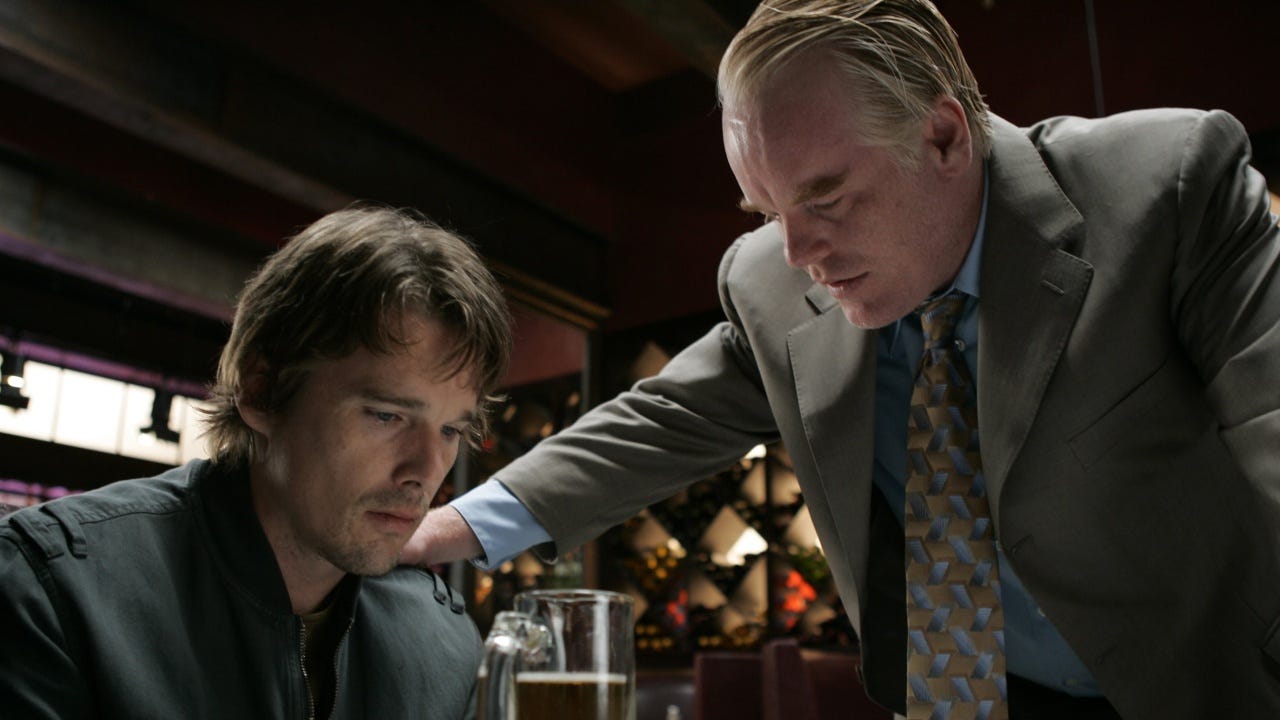
During my 53 years on planet earth, I’d never seen Before the Devil Knows You’re Dead. All this changed on Friday 6th June 2025. Here are the opening 13 minutes and first 3 scenes of the film:
Scene 1
Following minimal production credits and a pitch black screen, we find “Andy Hanson” (Philip Seymour Hoffman) and wife “Gina Hanson” (Marisa Tomei) in the throes of passionate love-making and as the opening scene develops, on holiday in Brazil. Post coitus and laughing and joking in each others arms, Andy smiles at the joint antics of this “old married couple” before questioning whether it was influenced by the “pot” but this is swiftly denied by Gina as they lie facing each other, blissfully happy, at peace with the world and as Andy can’t help stating “God, I’d love to live like this”. Turning away from her husband with a sigh, Gina wishes they could afford to stay in Brazil for the rest of their lives as a slight air of melancholia descends. Andy repeats “Everything is wonderful”, twice, as Gina, now wiping away a rogue tear admits “I don’t feel like such a fuck up when I’m here, that’s all”.
“MAY YOU BE IN HEAVEN HALF AN HOUR…”
“BEFORE THE DEVIL KNOWS YOU’RE DEAD”
Scene 2
The Day of the Robbery
Carter Burwell’s beautiful if ominous musical soundtrack accompanies a tracking shot of a car through a residential street before it comes to a stop outside a jewellery store and with a cheery “I love you”, a lady departs from the car and inside the shop for the beginning of a working day weekend. Preparing for the day ahead, a hooded man now enters the store, rolls down the blind over the entrance door and pointing a gun directly at the lady, orders her to turn out the lights, “don’t even think about the buzzer” and to stand silently in the corner as he raids the cash register, the safe and loots every and any tray of jewellery he can find. Bumbling and abusive, the robber is clearly taking far too much time for what should have been a simple robbery and although his white bag is full from the safe and trays, he demands the keys for the display cases that hold the store’s diamonds. We quickly cut to a drawer, the snatching of a set of keys to open the display cases but after immediately dropping the keys and then being unable to find the correct key for each display case, the robber begins to smash his way into the cases one by one. As he does so and with his back turned, the camera cuts first to the lady eyeing the still open drawer and then to her inching slowly toward it. As the robber continues struggling to smash his way into the contents of the display cases, the lady lunges for the drawer for an as yet unseen gun and quickly locating it, shoots the robber in the back. Collapsing to the ground, the camera cuts to an anguished lady coming to terms with shooting the robber as he now returns fire, sending the lady to a bloodied mess in the corner of the store. Rapid cuts now (from editor Tom Swartwout) as we see the robber inching on his back toward the entrance to the store (leaving a bloody trail in his wake) and the bloodied lady inching her way toward the gun she dropped when she was shot. Getting to his feet, the robber turns around to see the lady aiming directly at him and with one burst of gunfire, sending him flying through the glass door of the store.
Carter Burwell’s already ominous musical soundtrack now signals the robber sprawling on the pavement outside the store as we cut to a panicking getaway driver who cannot believe the scene unfolding in front of him. Speeding through the empty car park, the driver screams in anguish as he angrily rips off his flimsy disguise before thumping first the steering wheel and then his own head as he wails “I’m so stupid” before the scene ends with a slow zoom in on the driver as he makes his getaway, and close to anger filled tears.
Scene 3
Hank: 3 Days Before the Robbery
We cut to a close-up and then a wider view of a high school softball game before Andy and his brother “Hank” (Ethan Hawke) are descended upon in playful fashion at a hot-dog stall by Hank’s daughter “Danielle” (Sarah Livingston) and her joyful teammates. As Hank offers to pay for the girls food his brother playfully admonishes him with “Your money’s no good here”. Hank insists he’ll pay. His brother retorts with a more forceful “You sure?”. An icy end to the brief scene is soon to be replaced with an even colder one as Hank returns his daughter to the care of her mother and his estranged wife “Martha” (Amy Ryan) and following a bitter squabble over money, Martha slams the door on Hank as he angrily departs in the lift from her apartment. An immediate cut now finds Hank entering a local bar whilst talking on his mobile telephone, presumably concerning money. Angrily he snaps his mobile telephone in half as he sits opposite his smiling, carefree brother Andy before asking if he can borrow his phone. Still smiling at the plight of his brother, Andy laughs that he doesn’t have a mobile telephone, “brain cancer” he warns, before directing his brother to the payphone near the bathroom. The immediate differences between the two brothers are starkly apparent: whilst Andy is relaxed, smiling and well dressed, Hank is stressed, dishevelled and a world away in his own thoughts as Andy asks what’s happening with him and does he have the “world by the balls”? Andy jokes at his brother’s expense, saying he’s always admired his “wit”. Hank responds that his brother is a “prick”. Andy smiles before admitting “I always was”.
After a waitress delivers Hank’s drink, Andy moves the conversation to the prescient issue of money, for both of them. “You need money, so do I” continues Andy, “So let’s solve it”. We cut back and forth between the brothers as a still smiling Andy proposes a robbery as Hank downs a shot, unable to believe the words coming out of his brother’s mouth. It’s worth $600,000 according to Andy and a “victimless crime” that will net them $60,000 each after assorted costs that ensure they remain free and in the clear. “I can’t believe this is you talking” Hank admits with a smile before the camera angle reverts back to Andy as he, in his estimation, states candidly “It’s safe. Nobody gets hurts. Everybody wins. It’s perfect”. With a camera angle now back over Andy’s shoulder, director Sidney Lumet captures Hank questioning why and “This is a serious crime. I’m not a serious crime kind of guy” to which his brother retorts that he needs money, they both do, and “It’s not as serious as you might think”. Still smiling, Andy continues that he’s thinking of his “little brother” as his younger sibling opposite him smiles back, accusing him of only wanting to see him in order to propose his “crazy” idea. But Hank is in need of money, they both are, and Hank asks for further details.
“Not another word until you commit” Andy responds with a smile.
Director Sidney Lumet’s 43rd and final film before his death aged 86 in 2011 is an intriguing and fast paced if a little cold study in human relationships within the splintering branches of a family tree silently at war with itself and which simmers via a non-linear timeline and overlapping scenes from not only the brothers doomed to regret their Coen Brothers trope of a simple plan going horribly awry, but also from the perspective of both their wives and parents caught within their desperation for quick easy money. Similar to Christopher Nolan’s Memento 7 years earlier, the overlapping of the narrative continually adds layer upon layer to the story already told and spoilers aside, I’ll use the example of your star of the show Philip Seymour Hoffman by stating that he’s anything but the smiling, clean cut, well dressed and financially successful man he appears to be in the film’s earliest frames, a template of duality set for nearly character and brilliantly brought to life in the capable hands of Ethan Hawke, Albert Finney and a sparkling cameo of uneasy threat from Michael Shannon.
My only reservation, and from only one viewing of the film, is that I found it cold and distant with only one likeable character brilliantly portrayed by Marisa Tomei, but Lumet’s final film from a career including 12 Angry Men (1957), Serpico (1973) and Dog Day Afternoon (1975) was critically lauded at the time, appearing in dozens of critics top 10 films of 2007.
So I’ll watch again, if only for the reassuring screen presence of the much missed Philip Seymour Hoffman.
Thanks for reading. I hope this message in a bottle in The Matrix finds you well, prospering, and the right way up in an upside down world.
Whilst you’re here I may as well brag about the release of my trilogy of recently self-published books. Beautiful covers eh! As the title(s) would suggest, this is my life at the movies or at least from 1980 to 2024, and in volume 1 you’ll find 80 spoiler free appraisals of movies from debut filmmakers, 91 of the very best films appraised with love and absent of spoilers from 1990–2024 in volume 2, and in volume 3 you’ll find career “specials” on Paul Thomas Anderson and Quentin Tarantino together with the very best of the rest and another 87 spoiler free film reviews from 2001–2024.
All available in hardback and paperback and here are some handy links:
"A Life at the Movies Vol.1" - link to Amazon
"A Life at the Movies Vol.2" - link to Amazon
"A Life at the Movies Vol.3" - link to Amazon





